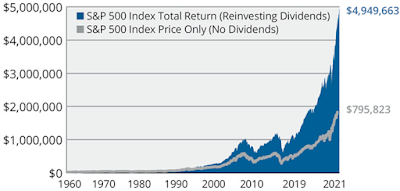The Power of Dividend
In stocks
investing, you probably heard about the “ growth stocks “, “dividend stocks “, “large-cap / mid-cap “ or “ blue chips “ etc .. and depending on your “desired
and expectation” of the ROI of your investment, you may choose what kind of
stocks to be included in your portfolio.
For most investors, I am sure you would have included some “income stocks “ into
your portfolio as part of the diversification, and also hopefully dividends can keep
the value of your investment rising even when market performance sours.
The Power of
Dividends:
Dividends have played a significant role in the returns investors have received during the past 50 years. Going back to 1960, 84% of the total return of the S&P 500 Index1 can be attributed to reinvested dividends and the power of compounding, as illustrated in FIGURE 1.
Below quote
from J.P Morgan Asset Management :
The power of dividends and compounding
In this simple illustration, an initial investment of $10,000 in
the S&P 500 price return index would have grown to over $200,000 since
1970. But if dividend payments were included, reinvested, and allowed to
compound over time, that same $10,000 investment would be worth more than
$900,000 today.
Further
reading on “ The Power of Dividend “
The Power Of
Dividend Growth ( from Investopedia )
The
Extraordinary Power of Dividends ( from The Motley Fool )
Proof
that you can't afford to ignore the power of dividends ( from The Telegraph )
“ Power of Dividend “ on STE’s Portfolio
As you may
know that my portfolio very much consists of “dividend stocks “ like REITs /
Business Trust / Telco and Banks and I am depending on dividend income to
survive for the past 3 years, hence the dividend is very important for me.
How about
the impact of dividends on the overall performance of my portfolio?
I have done
a quick check on my investment in the Singapore stock market since 2008 :
Total Return
XIRR ( including dividend ) = 18.4 %
What happens
if I exclude the dividend income, total XIRR would drop to 7.2 % only. Wow!
that’s a huge gap of 11.2 % lower if dividends are excluded, but of course, this
might be too extreme as in any case, the STI index still gives a dividend yield of
around 3.1 %. If we factor that in, there is still a whopping 8% different base
on my “dividend income “ investing strategies.
Initially, I
was wondering why there is such a big gap and if could it be because of my loss of
around -$84,333 (paper + realized, excluding dividend ) in investing in 3
O&Gs ( SMM/SCI/Keppel Corp) and 3 Telcos ( M1/StarHub/SingTel ) which made
XIRR without dividend worse than expected.
But even if
I exclude these 6 stocks in my analysis, the XIRR only improved marginally by 1 % only to
8.2 %, as such I would conclude that dividends play a bigger role in my journey
of wealth accumulation and overall portfolio performance.
How about
you? any idea what will be the impact of dividends on your portfolio’s
performance? mind to share if you have.
Cheers !!
PS:
Don’t just invest based on yield and beware of the “value trap “ in chasing yield-only stocks,
please also look at other aspects of financial analysis e.g FCF / Payout Ratio /
Debts to Equity Ratio, etc …
Quote Of The Day :
“Dividends
were de-emphasized in the 1990s, but after the dot-com bubble burst, investors
once again turned their attention to dividends.” From Morningstar





It is not dividend yield on current market investment cost; that superior dividend yield holding up multi-years investment portfolio XIRR across a few market cycles may have to depend on those personal dividend yield on investment cost.
ReplyDeleteWhen to find this type of personal dividend yield on investment cost?
Hi Uncle CW,
DeleteYes! Yield on investment cost and long term view in multiple market cycles is important to test the " dividend or income " investment strategy...also.. as you put it in your question,,,when to find,,,yah,,, only during time of crisis and we see blood on the street,,, but again , by then ...many will not invest because of fear that market will collapse and heart attack seeing price keep dropping,,,, :-(
Emotional and psychology play bigger part on this..
Cheers !!!
This article is so much helpful and gave me some awesome knowledge. The fundadvisor can be a great source of knowledge for financial management.
ReplyDeleteThanks for the wonderful blog it will really help us to get some good information about the investment.
ReplyDeleteBest Investment Opportunities